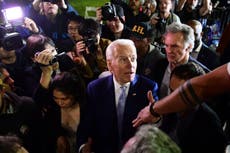John Bolton denies responsibility for deaths of Iraqi civilians: ‘You don’t know what you’re talking about’
Former national security adviser blamed post-invasion chaos on Iran and said US should not have been involved in nation-building

John Bolton, one of the leading US advocates of the Iraq War has denied having the deaths of Iraqi people on his conscience, insisting that the war only lasted four weeks and accepting no responsibility for the violence that reigned for years afterwards.
Mr Bolton, who served as UN ambassador under George W Bush before a spell as national security adviser under Donald Trump, made the comments to veteran interviewer Mehdi Hasan on his show on online service Peacock TV.
Mr Hasan asked Mr Bolton if he really harboured no regrets about the Iraq war, for which he was a loud advocate in the early 2000s.
“All those thousands of people who died in Iraq,” asked Mr Hasan, “all of those innocent Iraqi civilians, men, women, children, killed by US airstrikes, some of them in massacres – Haditha, Mahmudiyah, Balad – none of those weigh on your mind?”
“You don’t know what you’re talking about,” replied Mr Bolton. “The Iraq War, which was the period that lasted about four weeks and resulted in the overthrow of Saddam Hussein, was a brilliant military victory by the United States and other coalition forces.
“And that, the removal of Saddam Hussein from power, was the right idea at the time, and it’s true today.
“Where the United States made a mistake – and I’ve said this repeatedly over the years – was in the period following the overthrow of Saddam Hussein. I do not think we should have set up a coalition provisional authority. I think we should have kept troops there for a lot of reasons, but I think we should have turned responsibility for the government over to Iraqis as soon as possible.”
Mr Bolton reiterated his distinction between the invasion of Iraq (“the Iraq War”) and the long aftermath where the US-led coalition tried to establish political stability while fighting violence and sporadic attacks – a period that, as Mr Hassan said, included many civilian deaths, including in massacres for which Western forces were investigated by their own governments.
“People talk about the Iraq war as if it started in 2003 and lasted until 2011 when Obama withdrew everybody, as if every single decision in that eight-year period followed inevitably, unalterably, from the single decision to invade in 2003. And that’s simply not right.”
Mr Hasan pointed out that Mr Bolton was in fact part of the Bush administration after the four-week period he defines as the Iraq War, and that he did not quit in objection to what was happening. “Do you ever worry you may have to face a court to answer for that war and that occupation, for the war crimes that happened back then?”
Mr Bolton was dismissive. “Of course not, because what you’re saying is completely ludicrous, and those who made those kinds of criticisms are not reflecting what actually happened.” Blaming many post-invasion deaths on Iranian interference, which he said inflamed sectarian divisions and eventually “broke the country apart”, he declined several times to directly answer Mr Hasan’s question of whether those deaths weighed on him.
Since his tenure in the Trump administration, Mr Bolton has become one of the president’s most caustic critics. His book The Room Where It Happened, published earlier in 2020, portrayed the president as incompetent and unfit for office, disqualified by a perverse admiration for dictators and authoritarians and an inability to distinguish between the US’s interests and his own personal political gain.
The administration tried hard to block the publication of the book, claiming it would illegally reveal classified and sensitive material. In the end, it was released in June to a poor reception, with reviewers criticising Mr Bolton’s writing and his perceived grandiosity. A federal government lawsuit over the book’s publication is now underway.


Join our commenting forum
Join thought-provoking conversations, follow other Independent readers and see their replies
Comments